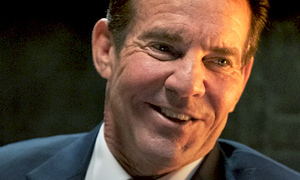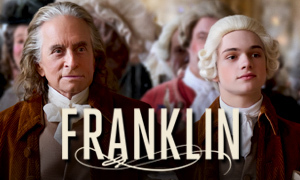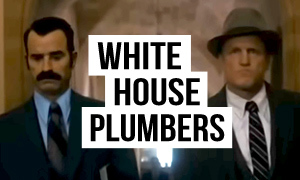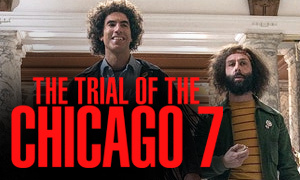The Post: History vs. Hollywood
| REEL FACE: | REAL FACE: |
Meryl Streep
Born: June 22, 1949 Birthplace: Summit, New Jersey, USA | Katharine Graham
Born: June 16, 1917 Birthplace: New York City, New York, USA Death: July 17, 2001, Boise, Idaho, USA (head trauma from a fall) |
Tom Hanks
Born: July 9, 1956 Birthplace: Concord, California, USA | Ben Bradlee
Born: August 26, 1921 Birthplace: Boston, Massachusetts, USA Death: October 21, 2014, Washington, D.C. |
Sarah Paulson
Born: December 17, 1974 Birthplace: Tampa, Florida, USA | Tony Bradlee
Born: January 15, 1924 Birthplace: New York City, New York, USA Death: November 9, 2011, Washington, D.C. |
Bob Odenkirk
Born: October 22, 1962 Birthplace: Naperville, Illinois, USA | Ben Bagdikian
Born: January 30, 1920 Birthplace: Marash, Aleppo Vilayet, Ottoman Empire Death: March 11, 2016, Berkeley, California, USA |
Bruce Greenwood
Born: August 12, 1956 Birthplace: Noranda, Québec, Canada | Robert McNamara
Born: June 9, 1916 Birthplace: San Francisco, California, USA Death: July 6, 2009, Washington, D.C. |
Matthew Rhys
Born: November 8, 1974 Birthplace: Cardiff, Wales, UK | Daniel Ellsberg
Born: April 7, 1931 Birthplace: Chicago, Illinois, USA |
Alison Brie
Born: December 29, 1982 Birthplace: Los Angeles, California, USA | Lally Graham
Born: July 3, 1943 Birthplace: Washington, D.C. |
Tracy Letts
Born: July 4, 1965 Birthplace: Tulsa, Oklahoma, USA | Frederick 'Fritz' Beebe
Born: February 20, 1914 Birthplace: Utica, New York, USA Death: May 1, 1973, New York City, New York, USA (cancer) |
Carrie Coon
Born: January 24, 1981 Birthplace: Copley, Ohio, USA | Meg Greenfield
Born: December 27, 1930 Birthplace: Seattle, Washington, USA Death: May 13, 1999, Washington, D.C. (lung cancer) |
David Cross
Born: April 4, 1964 Birthplace: Atlanta, Georgia, USA | Howard Simons
Born: June 3, 1929 Birthplace: Albany, New York, USA Death: June 13, 1989, Duval, Florida, USA (pancreatic cancer) |
Did Katharine Graham really take over the newspaper after her husband committed suicide?
Yes. Katharine Meyer married Philip Graham on June 5, 1940. Katharine's father, Eugene Meyer, handed The Washington Post over to his son-in-law Philip in 1946, making Philip publisher. In her autobiography Personal History, Katharine said that she never felt slighted by the fact that her father did not give the paper to her. "Far from troubling me that my father thought of my husband and not me, it pleased me. In fact, it never crossed my mind that he might have viewed me as someone to take on an important job at the paper."
Katharine's husband Philip battled alcoholism and mental illness throughout the marriage. On Christmas Eve in 1962, she discovered he was having an affair with Newsweek freelance journalist Robin Webb. Philip planned to divorce Katharine for Webb and started the process of dividing up the couple's assets. However, while at a newspaper conference in Phoenix, he is said to have suffered a nervous breakdown. He returned to Washington, D.C. and entered the Chestnut Lodge psychiatric facility. On August 3, 1963, he was released for the weekend. During our investigation into The Post true story, we learned that Philip committed suicide with a 28-gauge shotgun at the couple's home in Glen Welby. After his death, Katharine Graham stepped in to take control of the newspaper.
What exactly are the Pentagon Papers?
The Pentagon Papers is a U.S. Department of Defense study detailing the history of the United States political and military involvement in Vietnam from 1945 to 1967. In part, the Papers revealed that the U.S. had enlarged its military actions in Vietnam without informing the media and in turn the public. The undisclosed military actions included the bombings of nearby Laos and Cambodia, Marine Corps attacks, and raids along the coast of North Vietnam. Essentially, the Papers revealed that the U.S. government had lied about the scope of its military's involvement in the Vietnam War.
Is Bradley Whitford's character, Arthur Parsons, based on a real person?
No. In the movie, Bradley Whitford portrays Washington Post board member/adviser Arthur Parsons, who expresses the board's concern about having a woman in charge of the paper. "Kay, people are concerned, about having a woman in charge of the paper," says Parsons in the movie. "That she doesn't have the resolve to make the tough choices." He later vehemently opposes the publication of the Pentagon Papers. Fact-checking the accuracy of The Post movie revealed that the antagonist Parsons never existed in real life. He is at best a composite character created to represent those at the paper who felt that Katharine Graham was unqualified to be publisher because she was a woman.
Was The Washington Post's publication of the Pentagon Papers really as big of a deal as in the movie?
Arguably, no. After Daniel Ellsberg leaked 7,000 pages of the Pentagon Papers to The New York Times, it was the Times that got the story first and took the bigger risk in publishing the top-secret documents. They were unaware of the full scope of legal repercussions they would be opening themselves up to. This is the opposite of Katharine Graham and The Washington Post, which moved forward after The New York Times had broke the story and been temporarily banned from publishing the information. At worst, the Post knew they would be opening themselves up to the same injunction. In addition, The Washington Post had already been writing about the Times publication of the Pentagon Papers before they were able to get their hands on the Papers themselves.
Ultimately, by then the story was out and it was less likely that the government was going to harshly punish both papers. The Nixon administration was still adamant about silencing the story, but it was the leaker Daniel Ellsberg who was facing the harshest repercussions. He was the first person to be prosecuted under the 1917 Espionage Act and was looking at a maximum sentence of 115 years in prison. -TIME
Current journalists at The New York Times have taken issue with the accuracy of Steven Spielberg's movie, which they say gives too much credit to The Washington Post. "At The New York Times, colleagues feel that this is a New York Times story. They broke the Pentagon Papers," says Times journalist Cara Buckley.
Did The Washington Post really receive the Pentagon Papers on publisher Katharine Graham's birthday while she was having a party at her house?
Not exactly. The Post movie true story reveals that The Washington Post did receive the Pentagon Papers on Katharine Graham's birthday, but she wasn't hosting a party at her house. She writes in her memoir Personal History, "I celebrated at dinner with...Bob McNamara at Joe Alsop's." Alsop was a lifelong friend and fellow journalist.
Were the leaked documents received by The Washington Post really out of order and missing page numbers?
Like in The Post movie, the true story confirms that the journalists camped out in Ben Bradlee's library to sort the papers, which weren't organized well. They had received them in a cardboard box from leaker Daniel Ellsberg after The New York Times had been temporarily banned by the government from publishing any more of the documents. Consistent with the film, national editor Ben Bagdikian, portrayed by Bob Odenkirk, flew the Papers from Boston to Washington, D.C. with the cardboard box beside him. The Post purchased an empty seat next to him on the plane for the box, an "expense the Post didn't mind paying," Katharine Graham writes in her memoir Personal History.
Yes, Graham was hosting a party for a departing employee. Like in The Post movie, she was in the middle of delivering a toast when she received the telephone call for her decision about publishing the Pentagon Papers. -TIME
Unlike the movie, prior to the real-life call, Katharine hadn't been worried about publishing the Papers. "It never occurred to me that anything would happen to us, and I thought we were going to go ahead and publish," said Katharine in an interview with Chris Wallace. "I was called to the phone when we were right on deadline, because what had in fact happened was that the editors and the publishers said, 'Of course we're going to publish,' and the lawyers said, 'Really, you can't, because this is really double jeopardy in the face of the Times being enjoined.' She said that this is when the reality of the risk they were taking actually sunk in and she had to make up her mind on the spot. "I really gulped," said Katharine, "and I really was not what your heroic leader is. I just said, 'Oh, go ahead,'" she recalled, while humorously reenacting the deeply worried look on her face.
Was The Washington Post really about to become a publicly traded company in 1971, making it more vulnerable?
Yes. In answering the question, "How accurate is The Post movie?" we confirmed that at the time of the leak, The Washington Post was in the process of becoming a publicly traded company. Like in the movie, this added to the risk of publishing the Pentagon Papers. The price of its shares would surely drop if the company was hit with an injunction or lawsuits from the government, especially if the paper was found guilty in the end. "We had announced our plans and not sold the stock," Katharine Graham told NPR in 1997. "So we were particularly liable to any kind of criminal prosecution from the government."
Is President Nixon really the villain of the story?
No. This is perhaps the movie's biggest inaccuracy. Hollywood loves to put Nixon's head on the chopping block (rightfully so at times), but his portrayal as the villain here is not entirely accurate. The true story is more complicated. The Nixon administration was not even mentioned in the Pentagon Papers, which had been completed before he took office. With regard to the Vietnam War, Nixon didn't start it, he ended it. Yes, he did try to halt the publication of the Pentagon Papers, but his first reaction was to do nothing and allow the publication.
Deciding to move forward with the injunction against the Times wasn't to protect his own reputation. He was effectively trying to protect the reputations of his political adversaries, namely Lyndon Johnson and the deceased JFK, who had been in office when the study in the Pentagon Papers took place, which ultimately revealed how they had misled the public. If Nixon was trying to bolster his own self-image, he would have allowed the publication, becoming a champion for the public's right to know.
Secretary of State Henry Kissinger also helped to convince Nixon to oppose the publication, telling him that doing nothing would set a precedent for future secrets. In addition, Nixon was concerned with protecting the diplomatic standing of the U.S., especially as he was trying to end America's involvement in the Vietnam War.
None of these things mean that he did the right thing in using the courts to halt the publication of the Papers. He did not. The public indeed had a right to know, but trying to do what he believed was the responsible thing does not make him the villain here. And the filmmakers realized that, which is why the movie adds the Watergate break-in, an event that happened a year later. They want to bait you into believing that if he was the villain of the completely unrelated Watergate event, then he was unquestionably the villain here too.
What happened to Daniel Ellsberg, the man who leaked the Pentagon Papers?
Daniel Ellsberg had been working at the RAND corporation when he made the decision to leak the Papers. RAND is a nonprofit government-financed think tank that at that time focused on conducting research and analysis to improve decision making with regard to the military, the nuclear arms race, healthcare, and other government programs. It had taken Ellsberg three months to smuggle out and photocopy the classified military documents, returning each set of originals the following day. In violation of the 1917 Espionage Act and facing 115 years in prison, Ellsberg escaped prosecution after details emerged that government officials had illegally broken into Ellsberg's psychiatrist's office in hopes of finding information in his file that would prove he was mentally unstable (they found nothing useful). It also came to light that the FBI had illegally wiretapped Ellsberg without a court order. As a result, the charges were dropped.
Did the case go all the way to the Supreme Court?
Yes. At that point, both The New York Times and The Washington Post were under equal restraints from publishing articles about the Pentagon Papers. Like in the movie, the Supreme Court ruled in favor of the newspapers in a six-to-three vote. The court decided that the government did not provide substantial evidence to prove that the publishing of the classified history of the Vietnam War detailed in the Pentagon Papers was a national security risk. -TIME
Did Meg Greenfield really announce the Supreme Court's decision aloud to an anxious newsroom as she heard it on the phone?
According to Katharine Graham's memoir Personal History, this happened but it wasn't editorial page editor Meg Greenfield who was listening on the phone. The true story behind The Post movie revealed that it was deputy national editor Mary Lou Beatty who was on the phone call. Beatty is not depicted in the film.
Did President Nixon ban The Washington Post from the White House for reporting on the Pentagon Papers?
No. Here again the movie is somewhat misleading when it comes to Nixon. It's true that Nixon was angered when National Security Advisor Henry Kissinger told him that the leaked documents made him seem like a "weakling," but he did not ban The Washington Post and other newspapers from the White House for publishing them, as the movie would have you believe. In the film, Ben Bradlee (Tom Hanks) is trying to figure out a way to report on the First Daughter's wedding, given that the Post reporters are not permitted to attend. In reality, banning reporters from covering social events at the White House happened later, when the Watergate scandal was plaguing the Nixon administration. -TIME
Were the Pentagon Papers declassified?
Yes. During our investigation into how accurate The Post movie is, we learned that the Papers were declassified in 2011 and are available to read online. At the time of their declassification, The Washington Post reported that the leaked versions of the documents that it had examined decades earlier were largely redacted, illegible or incomplete.
Katharine Graham Interview & Related Videos
In addition to her memoir, get a firsthand account of the true story behind The Post movie by watching the Katharine Graham Pentagon Papers interview below.
Link-to-Learn More:







